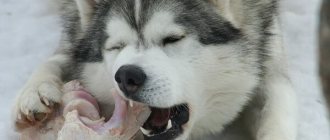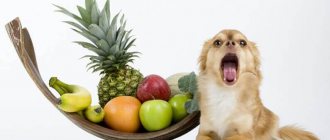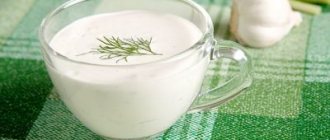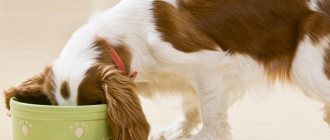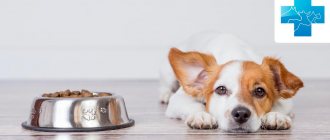If your family has decided to buy a Chihuahua, then the question certainly arises: what do they eat, what can and cannot be fed to the dog at home. The problem is that it is very difficult for a novice owner to make a decision, because he does not know what is better to choose, ready-made food or natural food. There are also hundreds of manufacturers of ready-made food on the market, and you run the risk of buying a low-quality product. In this article you will learn everything about the features of feeding a Chihuahua and learn how to do it correctly.
Unfortunately, when it comes to pet nutrition, people don't pay much attention to it. And all because many people do not know and have no idea about the importance of diet and its impact on the dog’s life. However, you cannot treat the issue of dog nutrition so frivolously!
Why do you need proper nutrition?
Proper nutrition is the key to health and longevity for any Chihuahua. After all, it affects the growth and development of both a puppy and the maintenance of the tone of an adult dog. Normal functioning of the digestive system, the body's resistance to infections, poisons and parasites, strong teeth, good gums, the formation of a strong musculoskeletal system and uninterrupted functioning of the central nervous system, strong muscles and joints - all this is impossible without specialized feeding.
The diet should be balanced. And food must contain all vitamins, minerals, micro and macroelements. Food at home is the main source of energy, this expresses the dog’s need for proteins, fats and carbohydrates.
Did you know the difference between the diet of humans and dogs? It lies in the fact that a person needs to eat fruits and vegetables to obtain vitamin C, and the dog’s body produces it itself.
Squirrels
Proteins are involved in the construction of tissues and cells, regulation and metabolism processes. These high-molecular compounds, built from 20 amino acid residues, play a primary role in the life of all organisms. The most protein is found in meat, fish, eggs, legumes and dairy products.
Carbohydrates
Carbohydrates are complex organic compounds consisting of sugars, starch and cellulose. Foods rich in carbohydrates include flour products, cereals, wheat, rice and vegetables. Fiber not only improves intestinal motility, but also slows down the absorption of sugar, so it can be included in the diet of dogs with diabetes. Excessive consumption can cause inability to absorb vitamins and minerals, flatulence and diarrhea. It is recommended to use corn, wheat and soy with caution; in addition to fiber, they contain allergens.
Fats
There has long been an opinion that fat is the main enemy of a healthy physical form, because its excess is deposited on organs, which leads to impaired metabolism and many diseases, including obesity. And this is true, but only large amounts of fat are harmful. But the body cannot do without an acceptable and obligatory dose of fat! It is a necessary component of proper nutrition. This is the most energy-intensive substance on which thermoregulation, the condition of the coat, as well as the normal functioning of the immune and nervous systems depend.
Vitamins and minerals
There are 2 types of vitamins - water-soluble and fat-soluble. Their deficiency leads to serious diseases, and an excess of one or the other leads to hypervitaminosis and hypovitaminosis - equally dangerous conditions. It is important to maintain a balance of these two types of vitamins. Minerals such as zinc and iron help prevent anemia and other disorders. And calcium and phosphorus are involved in the formation of the skeleton and teeth. It should be remembered that the body needs all the elements. But only in the right proportions. For example, an excess amount of phosphorus in the body is fraught with kidney problems.
Your dog should always have access to clean, fresh water!
How to help a pet if he feels bad?
If your pet does drink milk, and after a while he becomes ill, vomiting and diarrhea are observed, this indicates lactose intolerance and food poisoning. You need to help the dog and seek help from a veterinarian , who will prescribe medications for self-treatment at home.
In addition, at home you should :
- Limit your pet's food for a couple of days. If your dog asks to eat, give him some boiled rice.
- Provide constant access to water.
- On the second day, you can give fermented milk products (low-fat cottage cheese) to normalize digestion.
Newborn puppies
There are cases when, for some reason, a nursing bitch cannot provide her cubs with milk, then the mother’s milk is replaced with cow’s or goat’s. The first feeding of the puppy is carried out from three weeks. If this is ready-made food, then it is served only in soaked form. To do this, take a few granules of dry food, pour boiling water over it, leave for 20-30 minutes, and then give the puppies 1 granule.
A few pieces per day will be enough, gradually increasing the amount every day. In the first months they begin to include natural food. It is required to serve boiled meat and cottage cheese (diluted in milk to a more uniform consistency). Food is liquid and soft; dry food in an unsoaked form is strictly prohibited, because the stomach and intestines are not yet ready to digest solid food. From one month of age - rice, buckwheat, oatmeal with water or milk.
In what form, what kind, can it be added to food?
For representatives of the breed, goat's milk is preferable; it is more nutritious and easier to digest than cow's milk; to reduce fat content, it is diluted with boiled water in equal proportions. To prepare porridges, it is better to use whey with a low fat content.
Take the Attention Test! Find 10 differences! (click right here!)
Find the answer Are you bothered by some problem or question? Enter “Breed” or “Name of the problem” into the form, press Enter and you will find out everything about the issue that interests you.
Fermented milk products are allowed for puppies and grown dogs.
As you grow older
Puppies feed on their mother's milk until they are approximately 2 months old. But sometimes up to 4 months. It is recommended to completely wean offspring from mother's milk at 3-4 months. Further feeding of the Chihuahua depends on your choice and the dog’s taste preferences. There are 2 ways of feeding: natural and ready-made food.
There are dogs that can consume both types, and there are individuals for whom one type is suitable: either natural or prepared food. Some people experience diarrhea, diarrhea, and stomach problems from natural food, while others have a similar reaction to ready-made food. Just watch your four-legged friend. See what he likes to eat more. Does the food cause intestinal upsets and digestive problems? If yes, then this is a signal that the chosen feeding method is not suitable for you and needs to be replaced.
Do not mix natural and commercial food!
Harm
Of course, this product does not pose any danger to the life of an adult Chihuahua , but in large quantities it causes stomach upset, diarrhea and vomiting.
With long-term consumption of full-fat cow's milk, there is a large load on the liver and an allergic reaction to milk protein is possible.
However, not all dogs of this breed may experience distress after drinking milk and develop an allergic reaction. There are some dogs that drink milk even as adults and do not experience any such reactions.
Attention! In case of food poisoning in a Chihuahua, it is better for the dog owner to completely exclude not only milk, but also any other fermented milk products.
Natural or dry food, which is better?
There is no clear answer. Each of them has its own pros and cons . Many people beat themselves in the chest, claiming that “natural” is better, since the owner independently monitors what goes into his dog’s body, and these products contain all the necessary substances, minerals and vitamins. However, they are mistaken, because quite often such nutrition is not balanced, and it remains very difficult for a person to choose the right proportions. At a time when everything is already calculated in the package of dry food.
What to feed a chihuahua
The food that a Chihuahua eats must be warm and soft. If it is very cold, it should be heated, if it is very hot, it should be cooled.
Under no circumstances should you offer a Chihuahua food that the owner does not want to eat for any reason. Food prepared for a person will not benefit him, moreover, it can harm him. Failed, spoiled dishes should not end up in the dog's bowl. It should be noted that Chihuahuas have different appetites. Some are very voracious despite their small size, while others can go a whole day without eating anything. Food that the dog does not eat during the day must be thrown away.
Ready food
It is divided into dry (pellets) and wet (canned). Today, stores stock a whole range of products from various manufacturers. This or that brand is advertised on television. To choose high-quality food, do not believe advertising, but purchase only premium and super-premium food. These include Acana, Hills, Pro Plan, Orijen, Royal Canin, Eukanuba. In this case, price is an indicator of quality; the higher, the better the product.
pros
- Balance.
- Convenient travel.
- Easy to use.
- Quick cooking.
- Dosage.
- Convenient storage.
Minuses
Possibility of containing harmful additives: preservatives, dyes, flavorings and flavor enhancers.
Check the expiration date carefully and do not feed your Chihuahua an expired product.
Looking at the label
Study the composition. Avoid feeds where the main ingredient is an animal by-product. If “offal” is indicated, it means bones, skin, legs and beaks were used. Basics like these can be subcategorized and printed at the back of the package (with the hope that inattentive shoppers won't notice).
Of course, preservatives are harmful and have a very bad effect on the health of the Chihuahua. All packaged foods inevitably contain them. The safest of them are tocopherols, which are made on a vitamin basis. Such feeds have a shorter shelf life. Synthetic preservatives - BHA, BNT, ethoxyquin cause tumor formation in the stomach of rats, hamsters and mice. If the consumer needs the manufacturer, the telephone number, name and address of the distributor must be printed on the label. Sometimes they even print the email address and website on the Internet.
Don't feed your Chihuahua cat food!
FAQ
What to feed if you have an allergy?
There are all kinds of lines of hypoallergenic food, the most optimal and simple option. If you don’t want to give up natural food, you’ll have to work hard to find out what exactly your Chihuahua is allergic to.
Potentially hypoallergenic products are:
- turkey and rabbit meat;
- zucchini and cauliflower;
- rice.
Very often, an allergy can be triggered by a sudden transition from one food to another, due to a rapid change in proteins.
What to feed a Chihuahua with pancreatitis?
Pancreatitis is inflammation of the pancreas.
For pancreatitis, a diet low in fat and low in fiber is indicated, as it is very difficult to digest. From ready-made food, for example, the GASTRO INTESTINAL line has been developed.
What to feed a Chihuahua after poisoning?
First of all, a short-term fasting diet is necessary. After a day of fasting, you can try rice water. If you have an appetite, you can give boiled chicken breast, cottage cheese, but to a minimum - in small portions.
What to feed a Chihuahua if its teeth fall out?
If your dog has toothache, you should consult a doctor; perhaps a simple brushing will solve all your problems. But if the problem does start and the teeth fall out, then you need to make it easier for the dog to chew.
If the food is dry, then grind the granules and you can soak them in water (not broth!). When feeding natural food, you will have to give up hard-to-chew foods and chop the meat into smaller pieces.
Can Chihuahuas eat baby food?
Not recommended. If you give your dog such a “treat” once a month, there will be no harm. But you cannot feed on a regular basis. Although the products in baby food are all natural and no preservatives are used, we should not forget that the human and dog bodies are fundamentally different.
Natural food
If you decide on this diet, then monitor the quality and freshness of the products you purchase. Cooked porridge or other dishes should be at room temperature; do not give your dog hot food so that it does not get burned.
Advantages
- No harmful additives.
- The owner himself chooses the quality and monitors the freshness of the products.
- Contains all micro and macroelements, vitamins and minerals, amino acids.
Flaws
- Cooking requires a huge amount of time.
- Not balanced.
- Difficulty in storage.
Can a Chihuahua have milk: for an adult, a puppy?
Natural milk is an indispensable product when weaning a puppy from its mother; it promotes the normal growth and development of babies.
For older dogs, the drink acts as a laxative, and in some cases causes food allergies, accompanied by itching, skin rashes, swelling, and discharge from the nose, ears and eyes. The body of a mature animal does not produce the enzyme that facilitates the absorption of lactose, milk is excluded from the diet or replaced with a lactose-free drink for dogs, sold in zoological stores.
How to protect yourself from obesity?
This issue should be taken very seriously when caring for your animal. Chihuahua is a breed with a tendency to be overweight. To prevent the occurrence of this disease, follow the general rules.
- These dogs love to eat, and some of them cannot control their satiety. Free access to food is unacceptable.
- Feeding is carried out strictly according to the clock. To avoid malnutrition and oversaturation, do not break the schedule and stick to the established regime.
- Do not feed your dog from the communal table.
Older dogs are more likely to suffer from obesity, and this is quite natural, since many physiological changes occur at this time. Older dogs are less active and their metabolic rate is significantly reduced. It is very sad when obesity appears in young dogs due to overeating and mistakes of their owners.
Most owners do not realize that obesity entails a whole list of concomitant diseases: arthritis, tracheal collapse, inflammation of the ligaments and tenosynovitis, diabetes, diseases of the gastrointestinal tract, heart and kidneys, musculoskeletal system, respiratory tract and dislocations of the kneecaps. These diseases pose a great threat to such a small and fragile dog breed.
Reception frequency
This miniature breed has its own peculiarity - the process of growing up in a Chihuahua differs from its “large brothers”. A dog that reaches 8 months is considered an adult, and at this stage its growth stops.
Chart by age
- From 3 weeks to 2 months - 6 times a day
- From 2 to 6 months - 4 times a day.
- From 6 to 12 months - 3 times a day.
- From 1 year and older - 2 times a day.
- Dogs over 7 years old should be fed once a day.
Quantity
For dosage when feeding dry food, see the packaging. Small puppies start feeding with 1 granule. For one-month-old puppies, the measure will be about 1 - 2 teaspoons of dry or natural food. At 2 months, approximately 1 tablespoon is considered normal. As you grow older, the amount of food will increase, gradually reaching 1.5 - 2 tablespoons. The maximum dose for an adult is 1.5 - 2 tablespoons of food.
Calories at a Glance
The amount of calories consumed affects physical activity (energy) and the proper functioning of the dog's body. Calorie consumption is as follows:
- A growing puppy under the age of 1 year, healthy and active, requires about 50 kcal per 1 kg of body weight per day.
- An adult Chihuahua aged 1 to 7 years, healthy and receiving proper exercise, requires about 35-40 kcal per 1 kg of body weight per day.
- At an older age (8 years and above), with a sedentary lifestyle and possible health problems, only 30 kcal per 1 kg of weight per day is required.
The values given may vary by up to 20% depending on the activity level, metabolism and any existing health problems of the individual.
List of useful products
Meat
Beef, turkey, rabbit, veal, and horse meat are excellent as the main source of protein. Served in chopped boiled form, give preference to lean pieces. Experienced breeders strongly recommend excluding chicken. The risk of infection with growth hormones and antibiotics is too high.
By-products
When it is not possible to cook meat, offal is an excellent alternative. For variety, you can pamper your pet with beef innards: heart, stomach, kidneys, liver, lung, tongue, tripe, udder. It is forbidden to feed raw meat and offal to avoid infection with worms and parasites.
Fish
You should avoid river food, and sea food should be prepared no more than 1-2 times a week. Use low-fat varieties (limonella, cod, trout). The benefits of fish are undeniable, because it is a source of omega 3,6,9 fatty acids. Only it contains the required daily dose of most amino acids, such as glutamine, arginine, leucine, lysine, proline, cystine, alanine, glycine, isoleucine, threonine, valine. Fish also contains tryptophan, which has a beneficial effect on healthy sleep quality. The full composition of B vitamins perfectly supports the functioning of the central nervous system, calms, improves memory and concentration, maintains a good mood, prevents the development of depression, and has a positive effect on brain function.
The content of other vitamins and minerals (A, E, D, K,PP, C) and minerals (calcium, magnesium, sodium, potassium, phosphorus, manganese, selenium, iron, copper, zinc) helps stabilize blood cholesterol levels (bad cholesterol is displayed). Helps in improving the condition of the musculoskeletal system, skin, establishing metabolic processes, maintaining visual function of the eyes, healing and strengthening the cardiovascular system, removing heavy metals and toxins, bringing water balance back to normal, increasing the body's protective functions and strengthening the immune system. Its protein is easily digestible and does not burden the gastrointestinal tract.
Clinical studies from Harvard University have shown that consuming this product significantly reduces the risk of premature death from heart attack and stroke. It should be noted that owners of long-haired representatives will rejoice in the beautiful and shiny coat of their pets, acquired through the use of fish in the diet. It is very important to prepare the product correctly - you cannot fry or smoke it; fish is served only boiled or steamed. Carefully remove the fillet from the bones.
Dairy
Low-fat cottage cheese, kefir, milk, unleavened cheeses.
Cereals
Not all types are suitable, but acceptable - oatmeal, millet, rolled oats, egg, buckwheat, rice. Barley and semolina are practically not digestible and can cause intestinal volvulus. Buckwheat porridge remains the best option.
Vegetables
Boiled or with the addition of vegetable oil, carrots, cabbage, beets, pumpkin, zucchini, cucumber, tomato.
Eggs
No more than 1 - 2 times a week. 1 chicken or 2 quail eggs.
Fruits
Chihuahuas are one of the few breeds that love to eat apples, pears, bananas and tangerines.
Berries
Berries are a real storehouse of vitamins. And not only in the summer. Chihuahuas do not tolerate cold well; in winter they often catch colds, including from a lack of vitamins. To pamper your dog all year round and support its immunity, freeze cranberries, raspberries, strawberries, wild strawberries, blueberries, and currants in advance for the winter.
Can dogs be given raw or boiled carrots?
Carrots have a particularly positive effect on the dog's digestive tract and are therefore ideal for sensitive animals. In these cases, the carrots must be chopped or pureed. The pectins contained act as a protective layer in the gastrointestinal tract. Carrots also have an antibacterial effect and may even be helpful for diarrhea in dogs.
Can dogs be given raw or boiled carrots?
Can dogs be given raw or boiled carrots?
Carrot soup for dogs with diarrhea
If your dog has diarrhea or serious gastrointestinal problems, simply try making carrot soup. For this you need a kilogram of peeled and finely chopped carrots.
Boil the carrots with enough water and then leave the soup to simmer for an hour and a half. You may need to add water in between.
After the cooking time is over, mash. The softer the puree, the better. Then add a teaspoon of salt. Let the soup cool down and you can now feed your dog carrot soup.
Can dogs be given raw or boiled carrots?
Can dogs be given raw or boiled carrots?
In addition to its antibacterial effect, carrots also have a preventative effect against worms. For this, you must give dried carrots daily. Essential oils of carrots remove worms and their larvae from the body. can dogs have carrots, can dogs have carrots, can dogs have carrots, can dogs have carrots,
Source
How to create a diet?
To ensure a complete and balanced diet, follow the percentage ratio: 36% of all food is meat.
- 16% of all food is dairy products.
- 10% of all food is fish.
- 14% of all food is cereals.
- 15% of all food is vegetables.
- 9% of all food is fruit.
Sample daily menu for an adult dog
- Breakfast. 8.00 - 10.00. Boiled meat (or offal) or steamed trout with zucchini.
- Dinner. 15.00 - 16.00. Kefir, cottage cheese or 2 quail eggs.
- Dinner. 19.00 - 20.00. Buckwheat porridge with carrots, half an apple.
Make sure that your four-legged friend's diet alternates protein foods (fish, meat, eggs, cheese) with cereals, vegetables and fruits every day. So, for example, when choosing meat for the morning, you should provide your dog with vegetables, fruits and grains for lunch and dinner. The next day, choose fish with vegetables for breakfast, and for lunch and dinner, give dairy products, fruits, and porridge. Remember, fruits and vegetables, cereals should be included in every day, and meat, fish and dairy products are the basis of nutrition. Cereals are carbohydrates; too frequent consumption can lead to metabolic disorders.
Food for a pregnant bitch
The nutrition of pregnant and nursing mothers should be special. All basic products remain at your disposal, you just need to arrange them in a new way. If the pet eats store-bought food, then meat and egg yolks are added to it. If he eats natural food, then the first month after mating there is no need to change anything. After 4 weeks, the bitch’s need for proteins, vitamins A, D, E, B1, fish oil and folic acid increases. Hence :
- The share of meat is increasing - 60 - 65% of all food.
- From the 5th week of pregnancy, the bitch eats 3-4 times a day.
- Vegetables are preserved in the same quantity.
- A week before giving birth, calcium-rich and protein-containing foods are removed (to avoid eclampsia).
Cow and goat milk for dogs
Cow's milk is rich in fats and proteins, contains iron, phosphoric acid and other trace elements, it is used in feeding puppies, to increase calorie content, a chicken egg is broken into it. Give to mature individuals with caution.
Goat's milk is considered safer in terms of digestibility; it contains less lactose, which can cause a negative reaction, and enough easily digestible fats and proteins, calcium, and vitamin A.
These natural products contain all the substances required for the development of puppies in the absence of maternal feeding.
Nutrition for a nursing bitch
In the first week after giving birth, a pregnant mother is given tea with milk and honey to enhance lactation. Feeding, as before, is carried out 4 - 5 times a day. Dried apricots and prunes are especially useful during this period. After weaning the puppies, the diet is slowly reduced and returned to the usual amount of food.
Pregnant, lactating and puppies
It is not recommended to give milk to pregnant representatives of this breed , but in the first week after birth, to enhance lactation, it is recommended to give milk with black tea and honey. However, after 3 weeks, this drink should be removed from the animal’s diet.
In the first 2-3 weeks, puppies have enough mother's milk, since there are no more than 3-4 puppies in the litter. If there is a need for complementary feeding, then you can prepare a mixture of goat's or cow's milk with egg yolk . For 100 ml of milk - one yolk. It is better to feed with a pipette.
Especially for dogs
Now you can buy special milk at a veterinary store .
The most popular brands:
- Beaphar offers milk that is close in composition and taste to natural bitch milk. It is made from easily digestible whey and is used as puppy food.
- ROYAL CANIN created a drink that is similar in properties to bitch milk, with a high protein content.
- BritCare is a specially developed milk for puppies that is in no way inferior in taste and composition to mother's milk.
Prohibited Products
Please pay special attention that these foods should not be given to Chihuahuas! For them it is poison!
- Carbonated drinks.
- Alcohol.
- Caffeine.
- Hop.
- Pork.
- Sausage.
- Canned food.
- Tubular bones.
- Legumes.
- Plum pits.
- Apricot kernels.
- Peach pits.
- Walnut.
- Nutmeg.
- Macadamia.
- Avocado.
- Raisin.
- Grape.
- Pepper.
- Sugar, any sweets, candies, chocolate.
- Salt, salty.
- Spicy.
- Smoked.
- Roast.
- Pickled.
- Puddings, cakes, baked desserts.
- Mushrooms.
- Condiments, herbs, spices, mustard.
- Onions, onion powder.
- Potato tops.
- Rhubarb leaves.
- Tomato tops.
- Yeast mixture, flour, cookies, buns, bread.
- Pasta.
- Ice cream.

